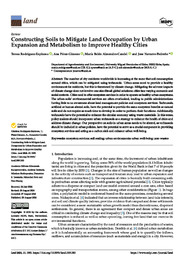Please use this identifier to cite or link to this item:
https://hdl.handle.net/11000/35073Full metadata record
| DC Field | Value | Language |
|---|---|---|
| dc.contributor.author | Rodríguez Espinosa, Teresa | - |
| dc.contributor.author | PÉREZ-GIMENO, ANA | - |
| dc.contributor.author | Almendro-Candel, María Belén | - |
| dc.contributor.author | Navarro-Pedreño, Jose | - |
| dc.contributor.other | Departamentos de la UMH::Agroquímica y Medio Ambiente | es_ES |
| dc.date.accessioned | 2025-01-21T09:24:59Z | - |
| dc.date.available | 2025-01-21T09:24:59Z | - |
| dc.date.created | 2024-08-24 | - |
| dc.identifier.citation | Land 2024, 13(9), 1383 | es_ES |
| dc.identifier.issn | 2073-445X | - |
| dc.identifier.uri | https://hdl.handle.net/11000/35073 | - |
| dc.description.abstract | The number of city residents worldwide is increasing at the same that soil consumption around cities, which can be mitigated using technosols. Urban areas need to provide a healthy environment for residents, but this is threatened by climate change. Mitigating the adverse impacts of climate change does not involve one-size-fits-all global solutions; cities face varying economic and social contexts. Cities need to offer ecosystem services in order to operate as healthy urban ecosystems. The urban soils’ environmental services are often overlooked, leading to public administrations having little to no awareness about land management policies and ecosystem services. Technosols, artificial or human altered soils, have the potential to provide the same ecosystem benefits as natural soils and do not require as much time to develop in order to perform their functions. Additionally, technosols have the potential to enhance the circular economy using waste materials. In this sense, policy makers should incorporate urban technosols as a strategy to enhance the health of cities and address climate change. Our perspective on soils in urban areas needs to be altered, as technosols should be included in urban policies, have the potential to serve as a crucial component in providing ecosystem services and acting as a carbon sink and enhance urban well-being | es_ES |
| dc.format | application/pdf | es_ES |
| dc.format.extent | 14 | es_ES |
| dc.language.iso | eng | es_ES |
| dc.publisher | MDPI | es_ES |
| dc.rights | info:eu-repo/semantics/openAccess | es_ES |
| dc.rights | Attribution-NonCommercial-NoDerivatives 4.0 Internacional | * |
| dc.rights.uri | http://creativecommons.org/licenses/by-nc-nd/4.0/ | * |
| dc.subject | Ecosystem services | es_ES |
| dc.subject | Soil sealing | es_ES |
| dc.subject | Urban environments | es_ES |
| dc.subject | Urban well-being | es_ES |
| dc.subject | Zero wastes | es_ES |
| dc.title | Constructing Soils to Mitigate Land Occupation by Urban Expansion and Metabolism to Improve Healthy Cities | es_ES |
| dc.type | info:eu-repo/semantics/article | es_ES |
| dc.relation.publisherversion | https://doi.org/10.3390/su15010192 | es_ES |

View/Open:
Constructing Soils to Mitigate Land Occupation by Urban.pdf
1,17 MB
Adobe PDF
Share:
.png)
